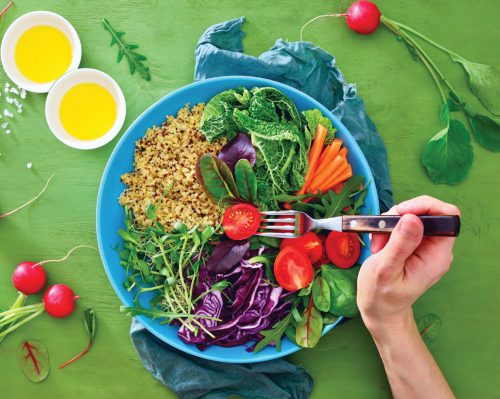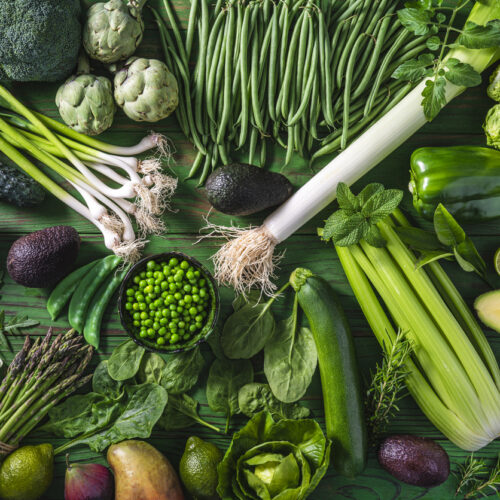
Plant-based eating is booming – but if you’re contemplating a vegan lifestyle, be well prepared to meet all your body’s nutritional needs.
While veganism may be starting from a small base, its popularity is growing rapidly both here and around the world. Perhaps it’s not surprising that vegan diets are no longer seen as extreme. If you’re new to, or considering, this style of plant-based eating, what are the nutrients you need to give special attention to?
Meat-free benefits
A plant-based diet has a lot going for it on the health front, with such diets linked to lowered risk of obesity, type 2 diabetes, heart disease and some cancers, as well as increased longevity.
Unlike vegetarian diets, vegan diets also exclude by-products of animals, including milk and eggs. A positive feature of vegan diets is that, with good planning, they can meet all the nutritional needs of almost anyone.
A benefit of a vegan diet is plant foods tend to be rich in many nutrients. Typically, compared with non-vegetarians, you’ll be eating more fibre as well as more thiamin, folate, magnesium, and vitamins A, C and E.
Nutrients to watch out for
On the other hand, there are potential dangers involved, especially if you’re removing meat and other animal products and not replacing them with suitable alternatives. People following a vegan diet need to ensure they get enough of the following four key nutrients.
-
Iron
The iron in plant foods is not as well absorbed as that found in animal foods. So, people following a vegan diet need almost double the recommended amount of iron that non-vegetarians require. However, a varied, plant-based diet can easily provide an adequate iron intake. Good plant sources of iron include legumes, tofu, nuts and seeds, whole grains, quinoa, fortified cereals, dried fruit and dark-green leafy vegetables. Eating vitamin C-rich foods, such as citrus fruits or broccoli, with meals will help boost iron absorption.
-
Vitamin B12
This is a significant nutrient of concern for vegans, as it’s mainly found in animal foods. Vitamin B12 is important for nerve transmission and blood cell formation.
Eating foods labelled as fortified with vitamin B12, such as some soy milks, is one way to get B12. Otherwise, give serious thought to taking a vitamin B12 supplement and have your doctor keep an eye on your blood levels.
-
Calcium
The absence of dairy foods in a vegan diet makes calcium another nutrient of concern. Calcium is important not just for bone health, but for vascular, muscle and nerve function. Good plant sources of calcium include calcium-fortified soy or almond milk, tofu set with calcium sulphate, almonds and a range of leafy green vegetables.
-
Omega-3 fats
These fatty acids are essential for your immune system and, because you can’t make them, you have to get them in food. With fish and their omega-3 fats off the vegan menu, you can go some way to meeting your needs through plant sources such as walnuts, flaxseeds, chia seeds or soybean oil.
The bottom line
As with any dietary pattern, a vegan diet can be healthy or unhealthy depending on the types of nutrient-rich or nutrient-poor foods that make up a menu.
If you ensure your vegan diet is varied, balanced and carefully planned, you can meet your nutrient needs throughout life – and reap a host of health benefits into the bargain.
We don’t know how many people in New Zealand are vegan. However, in 2016 Roy Morgan Research found 10.3 per cent of Kiwis say the food they eat is all, or almost all, vegetarian. That’s up from 8.1 per cent in 2011. The largest group are the 25 to 34-year-olds at 13.8 per cent.
Article sources and references
- Key TJ et al. 2009. Cancer incidence in vegetarians: Results from the European Prospective Investigation into Cancer and Nutrition (EPIC-Oxford). American Journal of Clinical Nutrition 89:S1620-6https://www.ncbi.nlm.nih.gov/pubmed/19279082
- Marsh K et al. 2011. Health implications of a vegetarian diet. A review. American Journal of Lifestyle Medicine 6:250-67https://journals.sagepub.com/doi/abs/10.1177/1559827611425762
- Saunders AV et al. 2013. Iron and vegetarian diets. MJA Open 199:S11-6https://www.mja.com.au/journal/2013/199/4/iron-and-vegetarian-diets
- Spencer EA et al. 2003. Diet and body mass index in 38000 EPICOxford meat-eaters, fish-eaters, vegetarians and vegans. International Journal of Obesity Related Metabolic Disorders 27:728-34https://www.ncbi.nlm.nih.gov/pubmed/12833118
- Shridhar K et al. 2014. The association between a vegetarian diet and cardiovascular disease (CVD) risk factors in India: The Indian migration study. PLoS One 9:e110586https://www.ncbi.nlm.nih.gov/pubmed/25343719
- Trapp C et al. 2012. Preparing to prescribe plant-based diets for diabetes prevention and treatment. Diabetes Spectrum 25:38-44http://spectrum.diabetesjournals.org/content/25/1/38
- Roy Morgan Research. 2016 Vegetarianism on the rise in New Zealand, roymorgan.com Accessed October 2018http://www.roymorgan.com/findings/6663-vegetarians-on-the-rise-in-new-zealand-june-2015-201602080028
www.healthyfood.com










